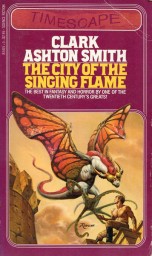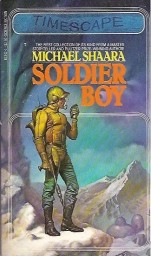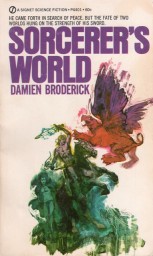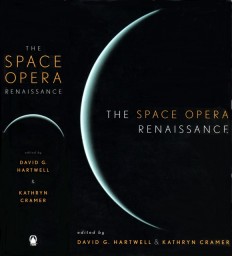 David Hartwell died a few days ago due to an accident that resulted in a cerebral hemorrhage. He was an editor who seemed to be intertwined with my own journey through science fiction and fantasy for the past 35 years.
David Hartwell died a few days ago due to an accident that resulted in a cerebral hemorrhage. He was an editor who seemed to be intertwined with my own journey through science fiction and fantasy for the past 35 years.
Hartwell edited the Timescape Imprint of Pocket Books from 1981 to 1984. I remember that imprint well. There were three Clark Ashton Smith collections from Timescape in the early 1980s. I had just become acquainted with Clark Ashton Smith reading the Arkham House volume, Tales of the Cthulhu Mythos. Coincidentally, there were two Clark Ashton Smith collections (City of the Singing Flame and The Last Incantation) available for me to dive in immediately at that time, with a third a few months down the road. The thing I liked about those collections is they were balanced. August Derleth did not know if Arkham House would survive long. As a result he started publishing the best Clark Ashton Smith stories at first. The later volumes had some drop off in evenness as a result.
Lin Carter was the first to publish Clark Ashton Smith in mass market paperback form. He arranged the contents according to fictional location. Smith did not write equal numbers of stories about Averoingne, Xiccarph, Hyperborea, Zothique, and Poseidonis. So those paperbacks had a lack of balance. The three Timescape paperbacks had about an equal number of pages and stories. Each would sample Hyperborea, Zothique etc. This would be the last time you would be Clark Ashton Smith on the shelves of your local Waldenbooks or B. Dalton Bookseller. I have not seen either the Penguin anthology nor the Nightshade volumes at my local Barnes & Noble.
There was a book from Avon from 1979, A Reader’s Guide to Science Fiction by Baird Searles, Beth Meachem, Martin Last, and Michael Franklin. That was my source of information on authors I knew nothing about. One of them was Jack Vance. The Timescape edition of The Dying Earth was my introduction to Jack Vance.
Timescape had a mix of the classics and new fiction that met a measure of quality. When you picked up a Timescape book, you knew it was going to be  more literary than an Ace or D.A.W. paperback, yet it would still scratch the wonder itch. You had reissues of A. E. van Vogt, Jack Williamson, Alfred Bester. There was a collection of Pulitzer winner Michael Shaara’s early science fiction. Glenn Cook’s The Swordbearer, which was a response to Michael Moorcock. Military science fiction was present with Jerry Pournelle, space opera with Ben Bova, sword and sorcery by Andrew J. Offutt and Richard K. Lyon.
more literary than an Ace or D.A.W. paperback, yet it would still scratch the wonder itch. You had reissues of A. E. van Vogt, Jack Williamson, Alfred Bester. There was a collection of Pulitzer winner Michael Shaara’s early science fiction. Glenn Cook’s The Swordbearer, which was a response to Michael Moorcock. Military science fiction was present with Jerry Pournelle, space opera with Ben Bova, sword and sorcery by Andrew J. Offutt and Richard K. Lyon.
David Hartwell seemed to like far future settings considering the Clark Ashton Smith, Jack Vance, Richard Lupoff’s One Million Centuries, and Gene Wolf’s Book of the New Sun tetralogy. The Jack Vance tribute anthology, Songs of the Dying Earth (2010) probably would not have been picked up by Tor if not for David Hartwell.
I had noticed that New American Library’s Signet imprint had published some interesting sword and sorcery novels at the end of what Karl Edward Wagner called the Conan Boom at the end of the 1960s. John Jakes’ The Last Magicians, George H. Smith’s Witch Queen of Lochlann, Ben Haas writing as “Richard Meade” The Sword of Morning Star and Exile’s Quest, and  Lin Carter’s greatest novel Lost World of Time. Ted White had told me that David Hartwell was at NAL at that time. Damien Broderick just said this week that it was Hartwell who bought his first novel, Sorcerer’s World (1970). So, it appears that David Hartwell was partially or in full responsible for one of the more interesting periods in sword and sorcery publishing history.
Lin Carter’s greatest novel Lost World of Time. Ted White had told me that David Hartwell was at NAL at that time. Damien Broderick just said this week that it was Hartwell who bought his first novel, Sorcerer’s World (1970). So, it appears that David Hartwell was partially or in full responsible for one of the more interesting periods in sword and sorcery publishing history.
The demise of Pocket Books’ Timescape imprint was a blow to me at the time. I was waiting for more great reprints. David Hartwell moved over to the new Tor Books. Some of the Timescape authors such as Gene Wolf and Glen Cook showed up at Tor in time.
Hartwell edited some interesting retrospective anthologies. My favorite is The Space Opera Renaissance (2006). He wrote a long essay that is a history of space opera and serves as a good entry point for someone new to the form. I would also recommend an essay “The Making of American Fantasy Genre” in The Secret History of Fantasy (Tachyon Publications, 2009).

Last year, I wrote a review of Tachyon’s The Sword & Sorcery Anthology. Hartwell is listed as one of the editors. The book just did not feel like a Hartwell anthology. David Drake confirmed my suspicions when he wrote to the comments that Hartwell’s name is on the book but he had nothing to do with selection of the contents.
The loss of David Hartwell leaves a big hole. He was an erudite individual when it came to fiction. He balanced the literary with the fantastic. I don’t know if we will ever see someone as an editor with his taste and ability again. Farewell David Hartwell.
Reading this blog often feels like reading a saga.
My introduction To Timescape was the Book Of The New Sun (The Shadow of the Torturer, The Claw of the Conciliator, The Sword of the Lictor, The Citadel of the Autarch) by Gene Wolfe. A fantastic post.